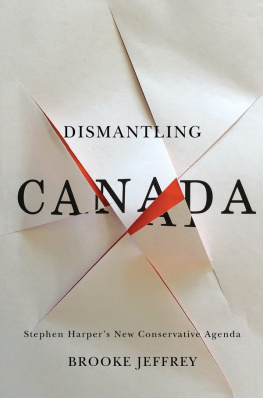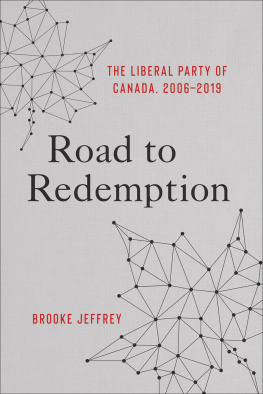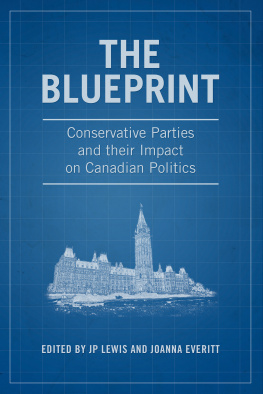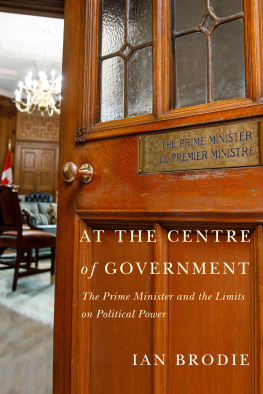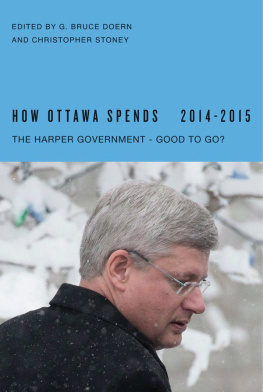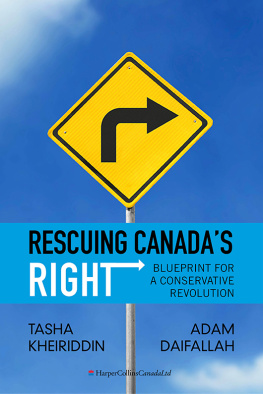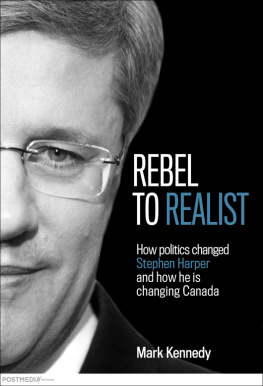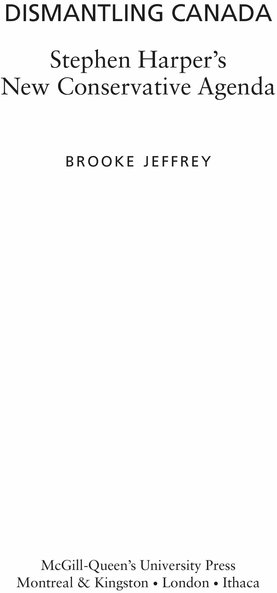DISMANTLING CANADA
McGill-Queens University Press 2015
ISBN 978-0-7735-4481-9 (cloth)
ISBN 978-0-7735-8250-7 (ePDF)
ISBN 978-0-7735-8251-4 (ePUB)
Legal deposit first quarter 2015
Bibliothque nationale du Qubec
Printed in Canada on acid-free paper that is 100 % ancient forest free (100 % post-consumer recycled), processed chlorine free
McGill-Queens University Press acknowledges the support of the Canada Council for the Arts for our publishing program. We also acknowledge the financial support of the Government of Canada through the Canada Book Fund for our publishing activities.
Library and Archives Canada Cataloguing in Publication
Jeffrey, Brooke, author
Dismantling Canada: Stephen Harpers new conservative agenda / Brooke Jeffrey.
Includes bibliographical references and index.
Issued in print and electronic formats.
ISBN 978-0-7735-4481-9 (bound). ISBN 978-0-7735-8250-7 (ePDF).
ISBN 978-0-7735-8251-4 (ePUB)
1. Harper, Stephen, 1959. 2. Conservative Party of Canada. 3. Conservatism Canada. 4. Canada Politics and government 2006. I. Title.
FC640. J44 2015 971.07'3 C2014-907580-4
C 2014-907581-2
This book was typeset by Interscript.
For Bill and Yvonne
Acknowledgments
Over the past two years while I was working on this book, many individuals provided valuable background information and assistance in locating sources. Others were most helpful in suggesting additional avenues of exploration. Several of them, including a number of former parliamentarians and bureaucrats, graciously agreed to lengthy interviews. However, virtually all of them declined to be identified, either in the manuscript or in the acknowledgments, a singularly revealing indicator of the climate of fear permeating the federal government and official Ottawa under the Harper administration. But as many of them noted, after nine years in power there is now so much material available on the public record that their own contributions, while useful to me, merely serve to reinforce what is becoming widely apparent. Nevertheless, I am grateful to them for taking the time to assist me along the way, and trust they will recognize themselves and their contributions in this text.
As always, I am also grateful for the support and encouragement I have received from colleagues and students at Concordia University, as well as the thoughtful and insightful comments on earlier drafts provided by several reviewers. They not only forced me to refine and occasionally clarify or expand on my initial arguments, but saved me from a number of minor, but potentially embarrassing, mistakes.
This book would never have seen the light of day without the gentle prodding of Jacqueline Mason, my very supportive editor at McGill-Queens University Press, who successfully convinced me to undertake this project in the first place, despite my initial reluctance to take on yet another multi-year commitment. I am also grateful to my very efficient and long-suffering copy editor, Patricia Kennedy, and to Ryan Van Huijstee, managing editor at MQUP, for shepherding the final draft through to publication in record time.
Finally, a huge debt of gratitude is owed to my endlessly supportive husband, whose technological expertise saved the day more than once, and to family and friends who were forced to endure regular progress reports. My thanks to all for their patience and understanding.
DISMANTLING CANADA
Introduction
I think the country has unlimited potential. Thats why I think it would be so exciting to realize that potential.
Stephen Harper, when asked by a reporter
Do you love this country?
29 November 2005
A new approach can draw in new people. Many traditional Liberal voters, especially from key ethnic and immigrant communities, will be attracted to a party with strong traditional views of values and family. This is similar to the phenomenon of the Reagan Democrats in the United States, who were so important in the development of the conservative coalition there.
Stephen Harper, 2003
Stephen Harper is a man of many firsts, each more impressive than the last. In 2003 he became the first leader of the merged Reform/ Alliance Party and the venerable Progressive Conservative Party, a merger which only a few years earlier would have been unthinkable. In 2006 he became the first prime minister to represent the new Conservative Party of Canada, a victory which would have been inconceivable less than six years earlier. In fact, when the Liberals secured their third successive majority victory in 2000, political scientist Bruce Doern wrote, Jean Chrtien stands astride the political scene without much effective opposition at the federal level.
The magnitude of Harpers accomplishment is reinforced by the speed with which it was achieved. In 2002 he managed to come back from the political wilderness to take over the struggling Alliance Party from Stockwell Day. The following year he orchestrated a Then, after a closely fought battle in the 2004 federal election, which reduced the previously unbeatable Liberals to a slim minority under the hapless Paul Martin, Harper required less than two years to turn his long-held dream of a Canada governed by a right-wing conservative party into a reality.
But Harper was not in power simply to implement specific right-wing policies, or to eliminate some long-resented Liberal programs, although these were certainly important short-term objectives. He was a man with a mission. He made this crystal clear in his 2011 victory speech, when he became the first Canadian political leader to declare that his long-term objectives included nothing less than the destruction of his political opposition, the despised Liberal Party of Canada, and the remaking of the political culture of the country he was about to govern, a country he could not say he loved.
Harper made considerable progress in implementing his short-term objectives, despite five years of minority government. This fact was underlined by Conservative pundit Tim Powers at a conference in the fall of 2010. Powers told participants that Harper no longer believed it was essential to obtain a parliamentary majority to accomplish much of his agenda. In a revealing comment, which spoke to Harpers single-minded focus and unprecedented control of the levers of power, Powers attributed the prime ministers confidence to the fact that he had already implemented a great deal of his agenda through non-legislative means, bypassing parliament.
Nevertheless, Harper was intent on achieving a majority and, in the May 2011 election, he succeeded. Moreover, he did it by becoming the first prime minister to form a majority government without the support of the province of Quebec, and without significant representation from the major urban centres of Canada, two extraordinary developments that would have far-reaching consequences.
Since then, Harper has wasted little time implementing the legislative side of his agenda, introducing sweeping reforms in several major policy areas, while maintaining an iron grip on virtually all aspects of governance. With the next federal election not scheduled until October 2015, the potential for the Harper Conservatives to effect even greater change is undeniable.

